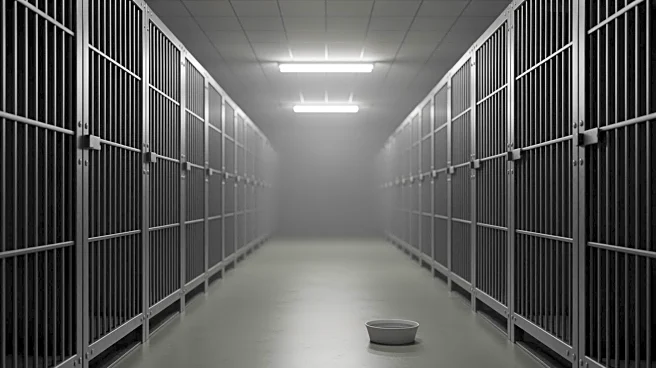What's Happening?
The Senate has passed a bill to end the longest government shutdown in U.S. history, which lasted 41 days. The vote was 60-40, with a small group of Democrats joining Republicans to advance the legislation.
The bill aims to reopen the government and extend funding until late January, while promising a future vote on extending health care tax credits. President Trump has expressed support for the bill, and House Speaker Mike Johnson has urged lawmakers to return to Washington for a vote, which is expected to take place on Wednesday. The shutdown has caused significant disruptions, including delayed federal food aid and airport delays, affecting hundreds of thousands of federal workers.
Why It's Important?
The end of the shutdown is crucial for federal workers who have been unpaid and facing layoffs. The bill's passage could alleviate economic disruptions caused by the shutdown, such as delays in federal services and impacts on air travel. The promise of a future vote on health care subsidies is significant for Democrats, who have been advocating for the extension of these credits. However, the lack of a guarantee for a House vote on the subsidies remains a contentious issue. The resolution of the shutdown could also impact public perception of both parties, as Democrats and Republicans navigate the political implications of the deal.
What's Next?
The House is expected to vote on the bill on Wednesday, with lawmakers returning from recess. The outcome of the vote will determine if the government can reopen and if federal workers will receive their delayed pay. The promised vote on health care subsidies in December will be a critical point of negotiation between the parties. House Speaker Johnson's stance on the subsidies will be pivotal, as he has not committed to bringing the issue to a vote. The political dynamics within the Democratic Party, particularly among moderates and progressives, will continue to evolve as they address the shutdown's impact and future legislative priorities.
Beyond the Headlines
The shutdown has highlighted the deep divisions within the Democratic Party, as moderates and progressives clash over strategy and priorities. The debate over health care subsidies underscores broader issues of affordability and access to health care in the U.S. The shutdown's resolution may influence future negotiations on government funding and health care policy, potentially setting precedents for how such issues are addressed in Congress.









